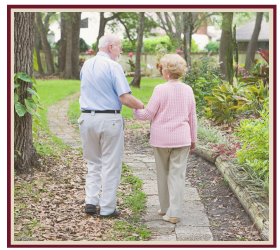Aftercare
The loss of a loved one can take its toll on you both physically and mentally. You may experience a roller coaster of emotions. One moment may find you incapacitated by grief, whereas in the next you may feel almost normal. Anger, fear, guilt, and panic are just a few of the emotions you may experience. This is completely normal.
 The physical effects of grief can include sleeplessness, excessive fatigue, headaches, general malaise, intestinal upsets, and dizziness. During periods of extreme stress such as grief, it is crucial that you try to eat regularly and to rest, since stress can suppress your immune system, making you more prone to illness.
The physical effects of grief can include sleeplessness, excessive fatigue, headaches, general malaise, intestinal upsets, and dizziness. During periods of extreme stress such as grief, it is crucial that you try to eat regularly and to rest, since stress can suppress your immune system, making you more prone to illness.
Your grief reaction and subsequent recovery can depend on the quality of your relationship to the deceased, your capacity to handle stress, and the type of support network that you have. If your relationship was strained or you have never experienced the loss of a loved one, your grief may be overwhelming.
Do not be afraid to seek the support of friends and family. They will want to help but might not be sure how. All too often, those who are grieving keep their feelings to themselves and feel that others will be able to anticipate their needs. As difficult as it may seem, it may be necessary for you to take the initiative.
For that very reason, many local and national support groups have been formed. These groups can provide a common place and a comfortable environment for expressing emotions through each phase of the grieving process.
- "Understanding Grief, Helping Yourself Heal" - Alan Wolfelt
- "Living When A Loved One Has Died" - Earl Grollman
- "What Helped Me When My Loved One Died" - Earl Grollmann
- "How To Survive The Loss Of A Love" - Melba Colgrove
- "Recovering From The Loss Of A Loved One" - Kathleen Fair
- "Living With Death And Dying" - Elisabeth Kubler - Ross
- "The Mourning After: How To Manage Grief Wisely" - Stanley P. Cornils
- "Living Through Mourning: Finding Comfort And Hope When A Loved One Has Died" - Harriet Schiff
- "Talking About Death: A Dialogue Between Parent And Child" - Earl Grollman
- "Straight Talk About Death For Teenagers: How To Cope With Losing Someone You Love" - Earl Grollman
-
Grief Support
We offer bereavement services for the families we serve. In addition, we have provided some helpful grief support links below. - Crisis, Grief and Healing: The first interactive grief website on the internet, offers discussion boards, articles, book suggestions and advice for men and women working through every aspect of grief. The site's founder, Tom Golden LCSW, has provided book excerpts, and contact information to help those healing from loss. Crisis, Grief and Healing
- The Hospice Foundation of America: Grief is often overlooked, misunderstood and undervalued in terms of its impact on individuals and society. HFA strives to inform people of their options when they are facing a life limiting illness, how hospice can help make the journey easier, and how to cope with grief.
Hospice Foundation of America
- The Highmark Caring Place: The death of a loved one is devastating to a child. The impact can be overwhelming and the children and family often need support. Thousands of people are helped each year at no cost through peer support programs, education, consultation, and referral services. The Caring Place
- Willowgreen: Offers support and information for those dealing with life transition & aging, illness & caregiving, loss & grief and hope & Spirituality. The site offers advice, products, and inspirational materials. Willowgreen
- Growth House: A website that offers international resources for life threatening illnesses and end of life care. The site features hypertext topic pages that explain major issues across the spectrum of hospice and home care, palliative care, pain management, grief, death with dignity, and quality improvement. It also offers disease-specific guides, an online bookstore, and even their own radio station.
The Direct Marketing Association (DMA), a member organization for businesses that market goods and services to consumer by mail, email and telephone, has developed a Deceased Do Not Contact list (DDNC). All DMA members are prohibited from soliciting individuals named on the list. Consumers may add a decedent to the DDNC list by visiting www.dmachoice.org and providing the deceased's name, address, telephone number and email address along with another email address that is used to verify the registration. A new, updated DDNC is distributed to DMA members at least once every three months.



